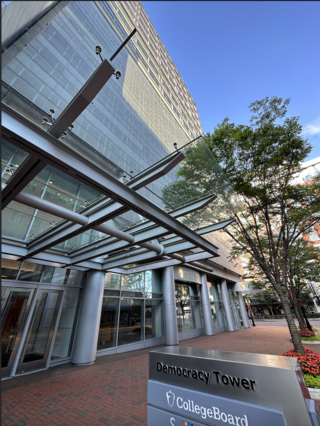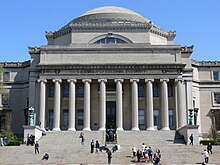
The Ivy League is an American collegiate athletic conference, which comprises eight private research universities in the Northeastern United States. The conference's headquarters is located in Princeton, New Jersey. The term Ivy League is typically used beyond the sports context to refer to the eight schools as a group of elite colleges with connotations of academic excellence, selectivity in admissions, and social elitism. Its members are Brown University, Columbia University, Cornell University, Dartmouth College, Harvard University, Princeton University, University of Pennsylvania, and Yale University.
Olin College of Engineering, officially Franklin W. Olin College of Engineering, is a private college focused on engineering and located in Needham, Massachusetts. Olin College is noted in the engineering community for its relatively recent founding, small size, project-based curriculum, and large endowment funded primarily by the defunct F. W. Olin Foundation. The college covers half of each admitted student's tuition through the Olin Scholarship. Olin College is ranked among the top undergraduate engineering programs within the United States.

The Illinois Mathematics and Science Academy, or IMSA, is a three-year residential public secondary education institution in Aurora, Illinois, United States, with an enrollment of approximately 650 students.

Upward Bound is a federally funded educational program within the United States. The program is one of a cluster of programs now referred to as TRiO, all of which owe their existence to the federal Economic Opportunity Act of 1964 and the Higher Education Act of 1965. Upward Bound programs are implemented and monitored by the United States Department of Education. The goal of Upward Bound is to provide certain categories of high school students better opportunities for attending college. The categories of greatest concern are those with low income, those with parents who did not attend college, and those living in rural areas. The program works through individual grants, each of which covers a restricted geographic area and provides services to approximately 59,000 students annually. The program focuses on academic and nonacademic resources and activities like visits to museums or tutoring for school work. Students are encouraged to be involved in Upward Bound for the entire academic year and a 6-week long summer program. Many students who are also granted access into the Upward Bound program are labeled as first generation college students, who are students that are the first in their family to attend college. This program is set in place for students who come from low income families as well as underrepresented schools and gives them an opportunity to excel in college.

The College Board is an American not-for-profit organization that was formed in December 1899 as the College Entrance Examination Board (CEEB) to expand access to higher education. While the College Board is not an association of colleges, it runs a membership association of institutions, including over 6,000 schools, colleges, universities, and other educational organizations.
The Free Application for Federal Student Aid (FAFSA) is a form completed by current and prospective college students in the United States to determine their eligibility for student financial aid.
Early decision (ED) or early acceptance is a type of early admission used in college admissions in the United States for admitting freshmen to undergraduate programs. It is used to indicate to the university or college that the candidate considers that institution to be their top choice through a binding commitment to enroll. Applying early decision brings a greater statistical chance of being accepted.
Student financial aid in the United States is funding that is available exclusively to students attending a post-secondary educational institution in the United States. This funding is used to assist in covering the many costs incurred in the pursuit of post-secondary education. Financial aid is available from federal and state governments, educational institutions, and private organizations. It can be awarded in the form of grants, loans, work-study, and scholarships. In order to apply for federal financial aid, students must first complete the Free Application for Federal Student Aid (FAFSA).
Noble Schools, is an open enrollment, public charter network of high schools and middle schools serving students throughout Chicago. Noble was co-founded in 1999 by Michael Milkie and Tonya Hernandez through a partnership between Ron Manderschied, President of Northwestern University Settlement House. Noble's first expansions, Rauner College Prep and Pritzker College Prep, opened in 2006. There are currently 18 schools in the charter school network: 1 middle school and 17 high schools. Noble schools are public and open to all students in Chicago and there is no testing required for admission.

Legacy preference or legacy admission is a preference given by an institution or organization to certain applicants on the basis of their familial relationship to alumni of that institution. It is most controversial in college admissions, where students so admitted are referred to as legacies or legacy students. The practice is particularly widespread in the college admissions in the United States; almost three-quarters of research universities and nearly all liberal arts colleges grant legacy preferences in admissions.

Woodrow Wilson High School is an American public high school located in Long Beach, California. This two-block campus is located approximately 1.5 miles from the Pacific Ocean, across from the Recreation Park, and approximately 3 miles from Orange County.
A Pell Grant is a subsidy the U.S. federal government provides for students who need it to pay for college. Federal Pell Grants are limited to students with exceptional financial need, who have not earned their first bachelor's degree, or who are enrolled in certain post-baccalaureate programs, through participating institutions. Originally known as a Basic Educational Opportunity Grant, it was renamed in 1980 in honor of Democratic U.S. Senator Claiborne Pell of Rhode Island. A Pell Grant is generally considered the foundation of a student's financial aid package, to which other forms of aid are added. The Federal Pell Grant program is administered by the United States Department of Education, which determines the student's financial need and through it, the student's Pell eligibility. The U.S. Department of Education uses a standard formula to evaluate financial information reported on the Free Application for Federal Student Aid (FAFSA) for determining the student's Expected Family Contribution (EFC).

College admissions in the United States refers to the process of applying for entrance to institutions of higher education for undergraduate study at one of the nation's colleges or universities. For those who intend to attend college immediately after high school, the college search usually begins in the eleventh grade with most activity taking place during the twelfth grade. Applications to many schools are due in October or November of senior year for Early Decision or Early Action, or in December or January of their senior year for Regular Decision, though the timeline may vary depending on the universities, some having an earlier deadline due to the fact that the admissions process may weigh in more on transcripts. Students at top high schools may often begin the process during their tenth grade or earlier. There are considerable numbers of students who transfer from one college to another, as well as adults older than high school age who apply to college.
The Specialized High Schools Admissions Test (SHSAT) is an examination administered to eighth and ninth grade students residing in New York City and used to determine admission to eight of the city's nine Specialized High Schools. An average of 25,000 students take the test to apply to these schools and around 5,000 are accepted. The test is given each year in October and November, and students are informed of their results the following March. Those who receive offers decide by the middle of March whether to attend the school the following September. The test is independently produced and graded by American Guidance Service, a subsidiary of Pearson Education, under contract to the New York City Department of Education.
Underwood International College, Yonsei University was founded in 2006 as a constituent college of Yonsei University. Based in Seoul and Incheon, South Korea.
The Federal Work-Study program originally called the College Work-Study Program and in the United States frequently referred to as just "Work-study", is a federally-funded program in the United States that assists students with the costs of post-secondary education. The Federal Work-Study Program helps students earn financial funding through a part-time employment program. Approximately 3,400 institutions participate in the program.

William E. Macaulay Honors College, commonly referred to as Macaulay Honors College or Macaulay, is a highly selective honors college for students at the City University of New York (CUNY) system in New York City. The college awards full-tuition scholarships to all of its undergraduates. For the class of 2020, there were 6,272 applicants for an enrollment of 537 students. The average high school GPA and SAT for the class of 2020 were 94.1% and 1414, respectively. Since 2016, the college has consistently received the highest rating for a public university honors college. Macaulay students have earned more than 250 prestigious awards, including 37 Fulbright Fellowships, 5 Truman Scholarships, 3 Rhodes Scholarships, and 28 National Science Foundation grants.
Prep for Prep is a leadership development and gifted education program dedicated to expanding educational access to students of color. The organization's programs are targeted toward high achieving New York City minority students and helps with scholarships placement into many of the most respected secondary schools and colleges in the country.
Gaining Early Awareness and Readiness for Undergraduate Programs is a federal grant program administered by the United States Department of Education. It was established in Chapter 2 of the 1998 amendments to the Higher Education Act of 1965 which awarded financial assistance to students and colleges from the federal government. GEAR UP was authored by Congressman Chaka Fattah and signed into law by President Bill Clinton in October, 1998.

The Government College of Engineering Karunagappally (CEK) is a public institute of engineering and technology in Karunagappally, in the north-west of Kollam district, Kerala, India. Established in 1999 by the Government of Kerala, it is the second engineering college in Kollam district the fourth engineering college under the aegis of the state government's Institute of Human Resources Development in Electronics. The institute is affiliated to the A P J Abdul Kalam Technological University, Recognized by AICTE and Accredited by National Board of Accreditation(NBA). It is the second engineering College in the Kerala Section to win the prestigious IEEE Region 10(Asia - Pacific) Exemplary Student Branch Award, Only student branch in Asia Pacific Region to win the IEEE MGA Regional Exemplary Student Branch Award twice in a row.









